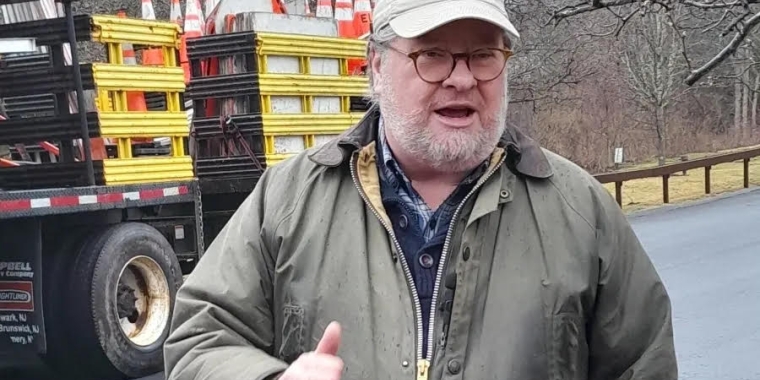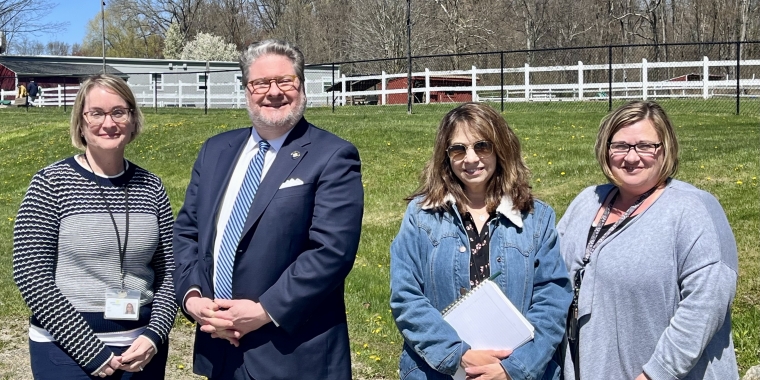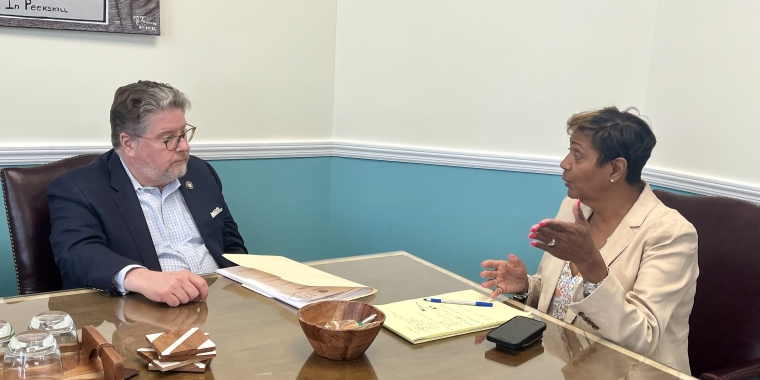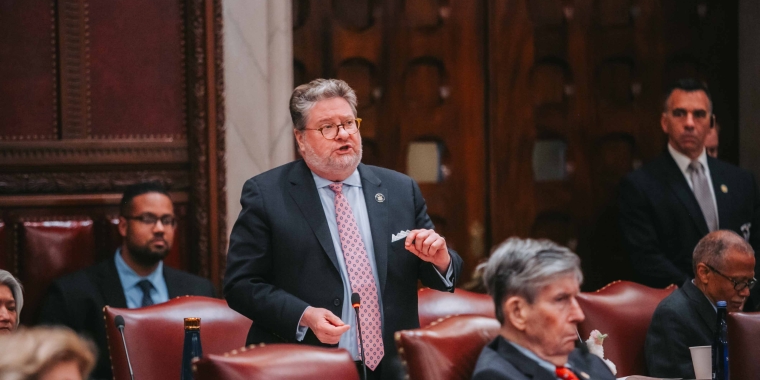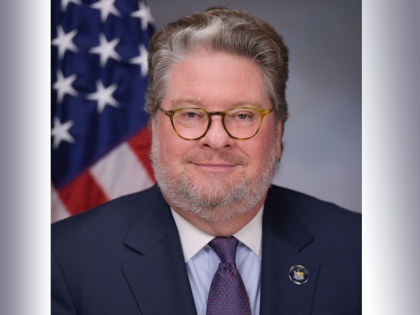
State Lawmakers, Advocates Call for Means Restriction Fencing on Area Bridges to Prevent Suicides
August 4, 2021
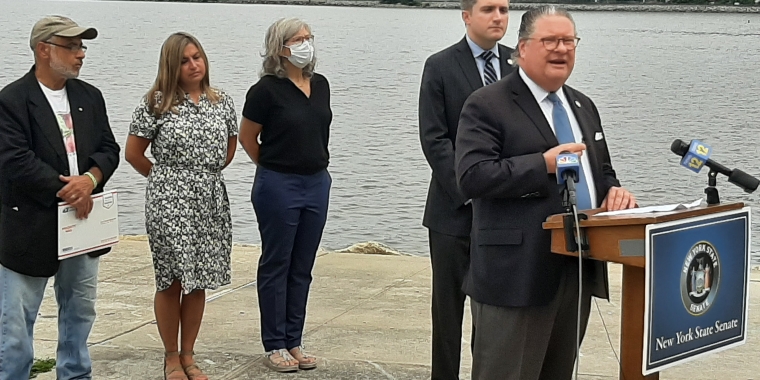
Peekskill, NY – Senator Pete Harckham and Senator James Skoufis, along with suicide prevention advocates and families of victims, held a press conference today and called for means restriction fencing, also known as climb deterrent fencing, to be installed on five area bridges overseen by the New York State Bridge Authority (NYSBA).
“Suicides are preventable if we have the will to expend the resources necessary,” said Harckham. “New York must stop only thinking of the balance sheet and start caring about human costs, individuals and families. The legislation that we are announcing today will require the Bridge Authority to install means restriction climb resistant fencing on all of its five bridges. This legislation will save lives.”
Harckham noted that in recent months, two individuals ended their lives on Bear Mountain Bridge, and that four ended their lives in the same spot during the previous year, an increase from the year before that. He added, “Today, across the U.S., someone will die by suicide every 11 minutes. It is the second-leading cause of death for those aged 15 to 24 years-old. So, it is imperative that we safeguard our friends and neighbors at risk.”
This week Harckham introduced legislation in the New York State Senate (S.7310) to require the fencing on the NYSBA bridges to curb suicide. (The NYSBA owns, operates and maintains five Hudson River crossings for vehicular traffic: Rip Van Winkle Bridge, Kingston-Rhinecliff Bridge, Mid-Hudson Bridge, Newburgh-Beacon Bridge and Bear Mountain Bridge.) Skoufis is a main co-sponsor of the bill in the Senate; and Assemblywoman Aileen M. Gunther is introducing the legislation in the State Assembly.
“For individuals with a suicidal impulse, interventions like means restriction fencing can literally mean the difference between life and death,” said Skoufis. “A temporary diversion may be all a struggling friend, neighbor, or family member needs to pull them back from the edge, and we must act to save lives now. I applaud Senator Harckham and Assemblymember Gunther for their commitment to this and many other behavioral health issues.”
“Suicide is a true public health crisis,” said Gunther. “In 2020, on average, one person died by suicide every five hours in the state. This is unacceptable. More needs to be done to meet the need for mental health services. Throughout my time in the Assembly, I have worked to increase services and funding for mental health to help address this crisis. More investment is needed in New Yorkers and their families to help those who struggle with mental illness. After what we have all been through with the pandemic over the last year, everything possible needs to be done to protect New Yorkers who have experienced one of the most trying periods in history. The climb deterrent fencing is a commonsense addition to ensure public safety and help to give more time to those struggling to cope with thoughts of suicide.”
“It has become apparent that added safety features are necessary to prevent suicides on bridges throughout the region,” said Assemblywoman Sandra Galef, who will be co-sponsoring the bill in the Assembly. “The Bear Mountain Bridge has call boxes and cameras, but these measures have not been enough to prevent the two suicides that have already taken place from the bridge in 2021. The addition of more fencing would go a long way toward preventing tragic deaths, and its installation is of the utmost importance. I sent a letter to the Governor on July 20 to raise these concerns—now is the time to get this done and save lives.”
Means restrictive fencing and other forms of barrier installation are proven methods of causing individuals to pause and to get through the intense, often brief, moment of suicide crisis. The fencing also gives suicidal individuals time to think and reconsider, as well as time for the intense suicidal risk to diminish, or for someone to intervene with mental health support and resources.
In comparing all bridge suicide prevention approaches, physically restricting access works best. Moreover, research consistently shows that the majority of those averted from a suicide attempt at a bridge do not go on to complete suicide elsewhere or with another method. Overall suicide deaths often decline throughout the surrounding area after bridge barriers are in place. The subsequent reduction in media coverage of suicides by jumping helps remove the allure of bridge locations as “suicide magnets” and helps to reduce copycat suicides.
“The American Foundation for Suicide Prevention’s New York chapters and volunteers thank Senator Harckham and his colleagues in the legislature for their leadership in introducing and supporting legislation to address suicide deaths in New York,” said Maria Idoni, Hudson Valley / Westchester area director of the American Foundation for Suicide Prevention. “Reducing access to lethal means is a proven, research supported component of suicide prevention. Having bridge barriers will save lives.”
Erika Lang Pierce, a Katonah resident attending the press conference, said, “A month ago, my family received the call no family should ever have to receive: a beloved family member had just ended his life on the Bear Mountain Bridge. Sadly, too many other families have received this very same news. We know from research that barriers are extremely effective at reducing suicides on bridges, and so I was shocked to learn that this bridge is without such barriers. I am extremely thankful that Senator Pete Harckham and others members of the state legislature are acting now so that families may no longer have to experience this terrible loss.”
Rocco Battista, a Warwick, NY, resident whose son Daniel took his own life in 2008, said, “When people are intent on doing something they are going to find a way. But when you have a means for them to reach out with a last breath of hope, which could be calling a friend or somebody who knows what they’re talking about, that might be enough. Having barriers on the bridges is important, and so is peer support. Suicide does not discriminate; it is you fighting a battle with you…We all have moments. We are human, and we are frail. We need each other.”
